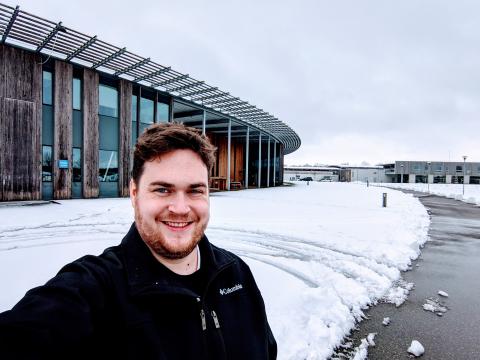Zachary, Chateaubriand Fellow 2018-2019

Zachary Buchanan is a 29 year-old PhD Student. He is working at the University of California, Davis under the supervision of Kyle N. Crabtree. The Chateaubriand Fellowship Program gave him the opportunity to come to France for 6 months within the framework of his PhD at the Institut des Sciences Moléculaires d’Orsay (ISMO, UMR8214). He gave an interview to Université Paris-Saclay during his stay.
How would you summarize your PhD?
I work in astrochemistry. I have a bunch of different projects, some of them consist in building new instruments to do measurements for astrochemistry, in other words molecules that you find in space, in interstellar medium (ISM). The main idea of my PhD was the study of how molecules react together, what the rate of reaction is under specific temperatures and so on. Here, in France, I am more focused on characterizing molecules. This information will be used in our kinetics experiments in the US or by different telescopes to identify some particular molecules. The impact is to look at unstudied reactions in ISM conditions in the gas phase we do not know a lot about. My PhD work would help to explain the formation of stellar systems. My other work, the building and the designing of new instruments will help scientists that are studying molecular spectroscopy.
What motivated you to come to France for a part of your PhD?
My advisor in United States, Kyle N. Crabtree, and my advisor here in France, Marie-Aline Martin-Drumel, did part of their post-doc together so they know each other and they have had previous collaborations. Marie-Aline was in the USA visiting two years ago. She talked to us about the Chateaubriand Fellowship Program. Kyle and Marie-Aline have wanted to do a collaboration with a shared student for a while. So the Chateaubriand Fellowship program was a good opportunity for everyone. That is one of the reasons why I came to this lab. There are also some instruments that are present at ISMO that are not in our lab in the US, which provide a nice complement for my US research. The Chateaubriand Fellowship program allows me to have direct access to those instruments. For instance, we can measure different frequencies. In my US lab we have a range of 26-40GHz and here we can measure 75-110GHz and 140-220GHz. Thank to these instruments, we have a better characterization of the compounds we study which give better results. Finally, in my time in the US, I spent a lot of time of building, engineering, and testing new instruments, so being here has allowed me to do more experiments, which is a nice opportunity. Moreover, I got to work at the Synchrotron Soleil for a week at the beginning of my program, which I doubt I would have done in the USA.
What are your plans for the future after your PhD?
For a while I have been thinking about working in industry, and I would like to stay in research and development. I really like the part of my thesis that consists in instrument building, so in the future I would like to design new things, new instruments, and new tools for scientists.
What are the differences that you noticed between France and the USA?
I walk a lot more here on a daily basis. There, I have a bike and the bus comes closer to my house, so it is easy to get around. The main difference that I noticed is people smoke more around you and the stores are a bit different from the US. I had to adapt to this but I do not feel any large changes in my everyday life. In the laboratory life, I noted that in my US lab we have more students, around 6 graduate students, in this particular lab at ISMO, there is only me and a Master’s 2 intern. Moreover, my advisor in the US has to teach a lot, so he spends a lot of his time preparing courses, he comes when he can, when he has time, so in general in the lab I don’t have my advisor around. The atmosphere of work however was not very different.
Was the French language a barrier?
At the beginning it was a bit complicated. Here in the lab everyone speaks English and we can communicate. Outside of the lab, I manage to find someone that speaks English a little and can use Google translate to understand what I need. I am also taking some French classes in order to try and learn enough to have short conversations. I received some help from my advisor in France for translation of official documents, from the Chateaubriand Fellowship Program for administrative stuff, and from Science Accueil for finding housing.
What do you think about Université Paris-Saclay?
It is really big, I mean in land-size and in number of PhD students. Everything looks new in Université Paris-Saclay, but it is understandable because it is a new project. The chemistry building where I work in the US was built in the 60s so the difference with ISMO (which was inaugurated in 2018) is marked.
Will you recommend Chateaubriand Fellowship Program to other PhD student in the USA?
Definitely, it is a cool program, it has given me a lot of opportunities and it is really fun to be here. As far as advice when applying, we had several meetings with both of my advisors in order to plan what kind of project I could carry out in France. That helped a lot for the writing process to apply for the Chateaubriand Fellowship Program, and I think it gave me a better chance for selection.
